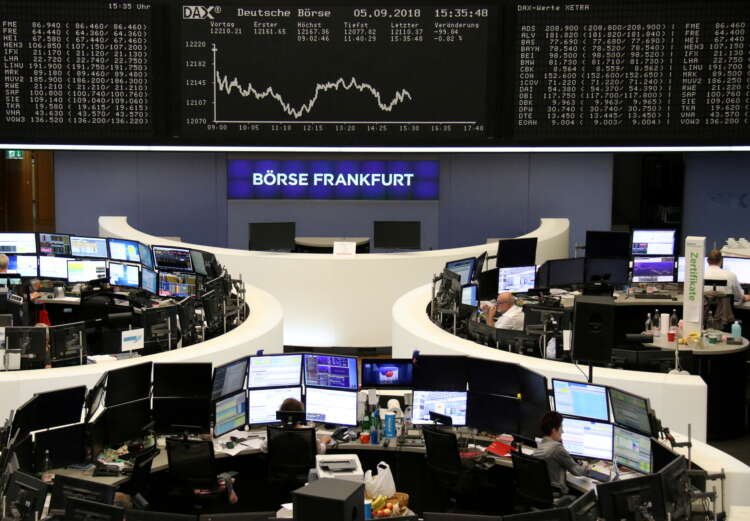Equities tumble and U.S. dollar rises as Russia/ Ukraine fears escalate
Published by maria gbaf
Posted on February 24, 2022
4 min readLast updated: January 20, 2026

Published by maria gbaf
Posted on February 24, 2022
4 min readLast updated: January 20, 2026

By Sinéad Carew
NEW YORK (Reuters) -Investors around the world lost their appetite for risk on Wednesday, with stocks selling off and the U.S. dollar gaining some ground as Ukraine declared a state of emergency amid intensifying fears of a full-scale Russian invasion.
Trading in many asset classes has been volatile since Russian President Vladimir Putin’s dispatch of troops earlier this week into parts of Ukraine. This triggered sanctions from Western countries and threats of more if Moscow advances further.
Oil futures, which were whipsawed during the day, settled well below their session highs and U.S. Treasury yields, while staying above Tuesday’s close, were also volatile.
Ukraine declared a state of emergency and told its citizens to flee Russia, while Moscow began evacuating its Kyiv embassy. The Russian-backed separatist leader of a Ukrainian breakaway region said Ukrainian government forces should withdraw from territory that his self-proclaimed state has claimed and take their weapons with them.
A senior U.S. official said on Wednesday that Russia is as ready as it can be to launch what could be a full-scale invasion, with 80 percent of troops assembled around Ukraine in attack positions.
After rising as much as 0.7% earlier on Wednesday the MSCI World Index, a leading gauge of equity markets globally, reversed course in morning trading and deepened losses as the day wore on to finish off 1.2%, registering its lowest level since April 2021. After falling as much as 1% and rising almost 2% during the day, Brent crude settled unchanged from Tuesday’s close at $96.84, while West Texas Intermediate settled up 0.21% at $92.10 per barrel after earlier falling as much as 1.9% and rising 1.7% all in the same day. [O/R]
Investors have also been grappling with the prospects of a U.S. Federal Reserve policy tightening aimed at combating surging inflation. But these worries have “been somewhat superseded by events in eastern Europe and in Russia,” said Rhys Williams, chief strategist at Spouting Rock Asset Management.
“So in the very short term, markets will go up or down based on whether (Putin) marches to Kyiv,” said Williams, adding that investors had appeared to accept Russia’s move into the Donetsk and Luhansk regions in Ukraine.
But if Putin “goes to Kyiv and there is a regime change and potentially a guerrilla war for the next two generations, that’s a more difficult scenario and there is frankly only one person who can decide this.”
The Dow Jones Industrial Average fell 464.85 points, or 1.38%, to 33,131.76, barely above the 33,119.685 level that would have confirmed a correction.
The S&P 500 lost 79.26 points, or 1.84%, to end at 4,225.5 and the Nasdaq Composite dropped 344.03 points, or 2.57%, to 13,037.49.
Michael James, managing director of equity trading at Wedbush Securities in Los Angeles, said there was currently “very little positive validation for buying anything.”
“If anything, President Putin is digging his heels in despite the increased sanctions,” said James. “That’s really adding to elevated nervousness about further aggressive actions and what that will mean for commodities and inflation overall as well as potentially lower market prices as overall equity sentiment continues to worsen.”
Treasury yields were higher as investors monitored Russia-Ukraine events and remained concerned about inflation and a potential Federal Reserve policy mistake.
Benchmark 10-year notes last fell 13/32 in price to yield 1.9912%, up from 1.948% late on Tuesday. The 30-year bond last fell 30/32 in price to yield 2.2963% up from 2.253% while the 2-year note last fell 1/32 in price to yield 1.6016%, up from 1.587%.
Trading was also choppy in currencies with the dollar index last up 0.127% and the euro down 0.18% at $1.1305.
The U.S. dollar strengthened sharply and was last up 3.2% against the Russian rouble, more than reversing its losses on Tuesday against the Russian currency.
The New Zealand dollar NZD= jumped after the Reserve Bank of New Zealand raised interest rates and said more tightening could be necessary. The kiwi last was up 0.71% versus the greenback at $0.678.
Palladium rose 4.5% to a near six-month peak driven by fears of a hit to supply from top producer Russia. Gold added 0.6% to trade at $1,908.62 an ounce.
Russia is the world’s third-largest producer of gold, while the country’s Nornickel is also a major producer of palladium and platinum, both of which are used in catalytic converters to clean car exhaust fumes.
(Reporting by Sinéad Carew, additional reporting by Karin Strohecker in London, Tom Westbrook, Vidya Ranganathan in Singapore and Divya Chowdhury in Mumbai; Editing by Chizu Nomiyama, Angus MacSwan and Jonathan Oatis)
Explore more articles in the Trading category











